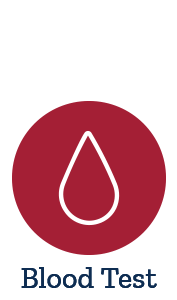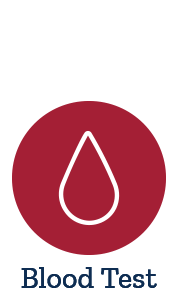Inflammation Panel Blood Test
Item # LC900010
Check for acute and chronic systemic inflammatory concerns

Inflammation Panel Blood Test
Item # LC900010
Check for acute and chronic systemic inflammatory concerns
The Inflammation Panel combines the most important and clinically relevant markers of systemic inflammation for the best insight into the body’s inflammatory response.
Life Extension® believes that chronic inflammation is a common denominator of all age-related diseases. Uncontrolled systemic inflammation increases risk of many degenerative diseases and cardiovascular concerns like heart disease and stroke. This panel is the best way to monitor systemic inflammation concerns with both well-established and new cutting-edge inflammatory biomarkers.
GlycA
GlycA (also known as glycosylated acetyls or glycoprotein acetyls) is a new biomarker of systemic inflammation reflecting the combination of various proteins that rise during inflammatory response. Instead of measuring just one biomarker, GlycA is a composite value of several different inflammatory markers (i.e. fibrinogen, AAT, CRP, AGP, haptoglobin [see image below]) which increases its effectiveness as a top level infammatory indicator.
GlycA has been associated with cardiovascular disease risk and cardiac event recurrence, as other inflammatory diseases like rheumatoid arthritis and psoriasis. It has also shown utility in evaluation of respiratory diseases, pancreatitis, diabetes risk*, and more.
Galectin-3
Galectin-3 is a critical signaling molecule involved with cellular growth and cell-to-cell communication. However, galectin-3 also initiates and amplifies inflammatory responses, and when left unchecked, encourages cells to aggregate and bind to surrounding tissues resulting in chronic inflammation.
C-Reactive Protein (High Sensitivity) (CRP)
CRP is a classic key marker of systemic and cardiovascular inflammation and has been associated with Alzheimer’s disease, diabetes and other inflammatory concerns.
ANA (antinuclear antibodies)
ANA reflects the immune system’s attack on the body’s own cells. This is a primary test to help evaluate a person for autoimmune diseases. ANA is the best way to screen for autoimmune inflammation concerns. This test is performed using the indirect immunofluorescence assay (IFA). When antibodies are detected, this test provides both the antibody concentration as well as the antibody pattern, helping assess the severity of antibody response and differentiate different autoimmune concerns.
NOTE
*This test does not reflect glycosylated/glycated hemoglobin (HbA1c) and does not provide information on glucose management. The HbA1c test is available here: LC001453
The following figure helps visualize how a GlycA measurement reflects the composite of various acute phase reactants:
 Ballout RA, Remaley AT. GlycA: A New Biomarker for Systemic Inflammation and Cardiovascular Disease (CVD) Risk Assessment. J Lab Precis Med. 2020 Apr;5:17. doi: 10.21037/jlpm.2020.03.03. Epub 2020 Apr 20. PMID: 32363327; PMCID: PMC7194207.
Ballout RA, Remaley AT. GlycA: A New Biomarker for Systemic Inflammation and Cardiovascular Disease (CVD) Risk Assessment. J Lab Precis Med. 2020 Apr;5:17. doi: 10.21037/jlpm.2020.03.03. Epub 2020 Apr 20. PMID: 32363327; PMCID: PMC7194207. Figure 1: A simplified illustration showing how the GlycA ‘peak’ on 1H-NMR relates to systemic inflammation.
In the setting of inflammation, irrespective of the trigger, macrophages are recruited to the site of inflammation where they secrete a variety of cytokines, namely IL-1, IL-6, and TNF-alpha. These cytokines act locally to induce an inflammatory response aimed at removing the insulting trigger and promoting subsequent tissue recovery. However, some of these cytokines also enter the systemic circulation and reach the liver, where they induce an increased production and secretion of several so-called acute phase reactants, as well as various glycosylation-mediating enzymes, known as glycosyltransferases, which alter the glycosylation patterns of the latter acute phase reactants. The acute phase reactants themselves, and their glycosyltransferase-modified derivatives (denoted by * in the figure) contribute to the GlycA peak seen on the 1H-NMR analyzer (AAT: alpha-1-antitrypsin; AGP: alpha-1-acid glycoprotein; CRP: C-reactive peptide)
The laboratory services are for informational purposes only. It is not the intention of National Diagnostics, Inc and Life Extension to provide specific medical advice but rather to provide users with information to better understand their health. Specific medical advice including diagnosis and treatment will not be provided. Always seek the advice of a trained health professional for medical advice, diagnosis or treatment.
Both the physician and the testing laboratory are independent contractors with whom National Diagnostics, Inc makes arrangements for your blood tests. Neither National Diagnostics, Inc or Life Extension will be liable for any acts or omissions of the physician, the testing laboratory, or their agents or employees.
A clinician's order is required for many tests. Where applicable, an independent clinician will review your test request and determine whether to authorize the test, if appropriate. For additional information, see PWNHealth Terms of Service.
Life Extension - Why We Do It?
The Best Supplements Science Can Offer
When putting something in your body, you should be confident that you’re getting the nutritional benefits your body deserves. We've been delivering high-quality, science-backed supplements for more than 40 years.
What Matters to You, Matters to Us
We're committed to empowering you to live a healthier life. Whether it’s finding sustainable partners for our ingredients or funding the latest anti-aging research, we're all about your health & wellness.
Highly Recommended
98% of our customers recommend us to family and friends. We're very proud of that because our loved ones matter to us—and we're willing to bet you feel the same way.
Product Transparency
40 years of research dedicated to bringing you premium, scientifically-validated formulations.
Product reviews are provided for informational purposes only and reflect solely the views and opinions expressed by the contributors and not those of Life Extension. We do not verify or endorse any claims made in these reviews.




